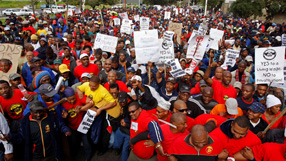
The state employees are the latest workers to threaten industrial action that could disrupt the world's largest sporting event staged for the first time on African soil, embarrassing President Jacob Zuma and his government. Officials played down the threat.
"There is no need to press the panic button," Randall Howard, special adviser to the Public Service minister, told a news conference.
The unions said the workers, including nurses, police officers, teachers and other government officials such as immigration staff, turned down a 6.2 percent wage raise and demanded an above inflation 8.5 percent salary increase.
"If the conciliation efforts fail next (week on) Friday, we will have no choice but to strike in the middle of the World Cup," Manie de Clerq, secretary-general of the Public Servants Association told Reuters.
De Clerq said a potential strike could include immigration officials, leaving the country's ports of entry short-staffed at a time when hundreds of thousands of visitors are descending on South Africa for the tournament.
"It is unfortunate and we don't want to spoil the games but you can't give train drivers big increases and ignore state workers," said de Clerq referring to above inflation increases given to workers at the country's logistics group Transnet.
Fourteen other unions affiliated to the country's powerful Congress of South African Trade Unions (COSATU) also threatened to strike.
The best features, fun and footballing quizzes, straight to your inbox every week.
"We refuse to be blackmailed by the employer because of the World Cup 2010 and we shall fight until our demands are met," Mungwena Maluleke, the negotiator representing COSATU unions, said in a statement.
Labour unions have used the tournament, which starts in less than 24 hours, to bargain for higher wages which analysts warn could in the long run ruin the country's ability to attract investment and create jobs as it recovers from recession.
"At the end of the day, you need to set caps because what you spend on public sector wages poses an upside risk to the fiscal deficit," said Peter Attard Montalto, emerging markets analyst at Nomura International.
Zuma is already at odds with his allies in the unions and the communist party over his failure to adopt more pro-poor policies and the wage spat could worsen relations.
 Join The Club
Join The Club





